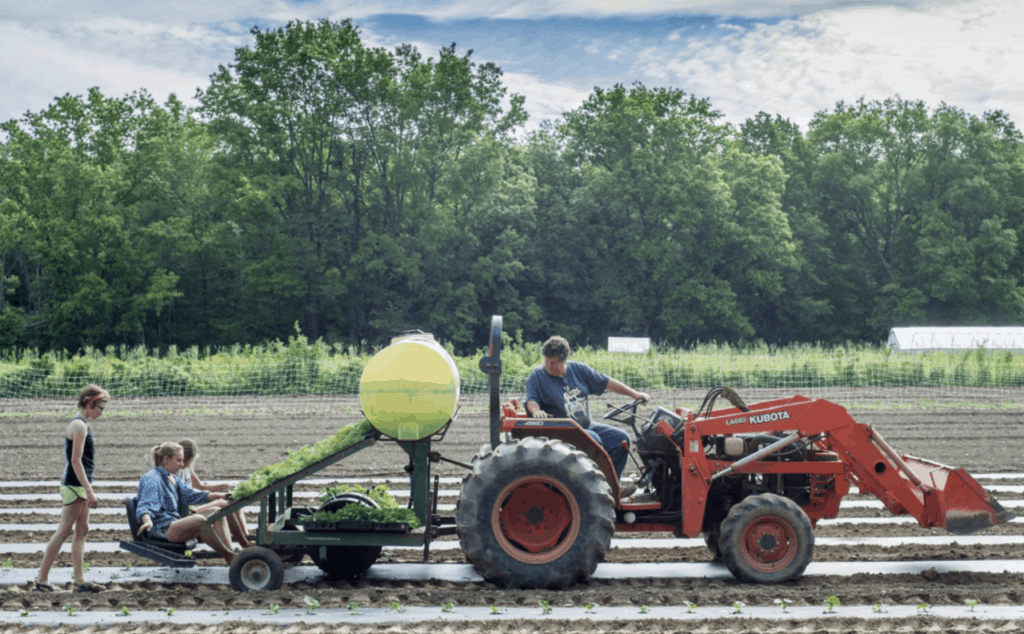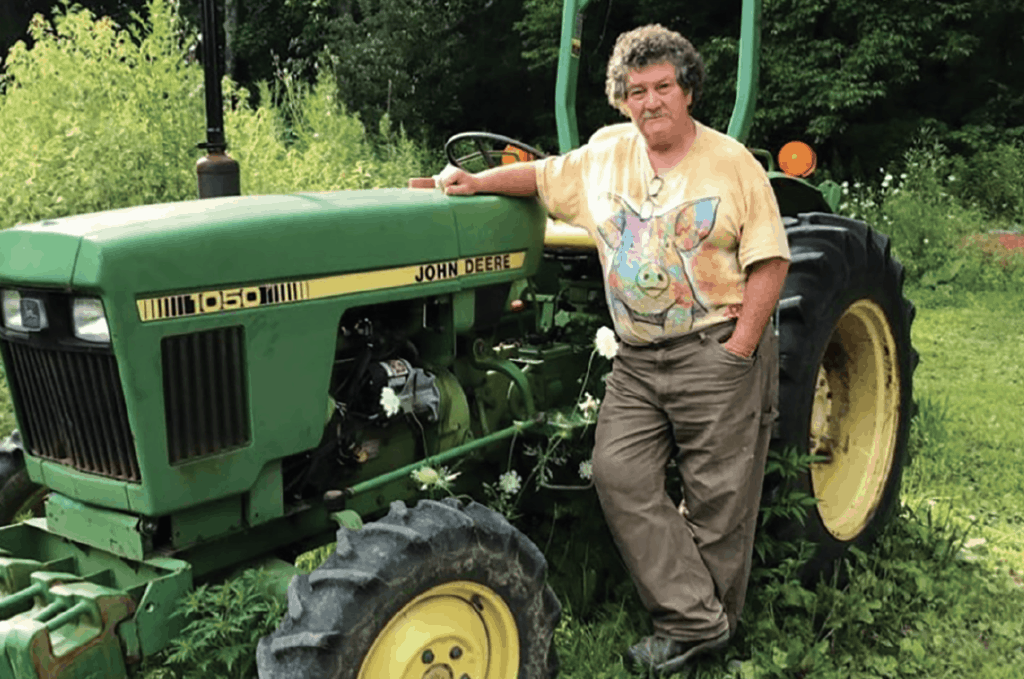By Ethan Weinstein
https://podcasts.apple.com/us/podcast/one-farmer-feeding-the-world/id1578946939?i=1000531218275

“It’s gonna sound bizarre: I don’t focus on making a living, I focus on feeding people. And I have this little mantra in my head, that the farmer that’s worried about feeding his family may starve; the farmer that’s worried about feeding the world will never starve.”
Greg Cox has devoted his life to feeding the world, and Rutland is the center of his world. His farm — Boardman Hill Farm — sits on over 70 acres in West Rutland, and the Vermont Farmers Food Center (VFFC), which he leads, rises alongside West Street. Since attending Johnson State as a freshman in 1968 — “the Summer of Love” — Cox has called Vermont home. He has addressed food insecurity, nutrition-based illness, the struggles of small farmers, and the declining local economy all through agricultural projects. In each endeavor, he works to give more than he takes; and he succeeds.
Asked about all the projects he has going on his farm, Cox prefaced his response, saying, “I think I have an innate fear of boredom.” He raises chickens, plans to get back into breeding pigs, is increasing his perennials like peaches and raspberries, and grows “just about every vegetable you could possibly imagine.”
This is only a list of the plants and animals present at Boardman Hill — Cox also spearheaded a 1-acre community solar array on his property, funded, planned, and implemented entirely by community investors. “In [2015], when this thing went online, we were the largest single phase solar project in the state of Vermont, the cheapest solar energy produced in the state of Vermont, and we were completely green because we kept the solar credits,” meaning Cox did not sell his solar offset credits to polluters hoping to superficially offset their emissions. Boardman Hill Solar Farm, which won a Governor’s Environmental Excellence Award in 2016, is now a model for people across the state. The leaders of the project even got a ruling from the IRS that allowed community owners to receive personal energy tax credits for their involvement, even though the array is located away from individual homesteads.
Nature boy, mountain man
Cox’s love of nature began as a child on Long Island. He spent weekends clamming, summers picking berries. He watched bluefish and stripers chase baitfish ashore, observed sharks breeding. High and low tied gave his life rhythm.
But within a decade, everything changed. “When I grew up on Long Island one of the things that made me insane was going out on Long Island Sound fishing and watching the garbage scows leave the island and head out to dump the garbage in the ocean: common practice,“ Cox said. Phosphate detergents threatened the shellfish. Money came in; the farms went out. “Everything became ticky-tack houses: three different styles, 100 houses in a development. And they basically destroyed the environment for all these critters.”
After high school, Cox wanted to move to Canada, live as a “mountain man,” fishing and gathering. He settled for Vermont.
“I fell in love with the old-time Vermonters,” Cox said. “They were so pure. And I said, ‘My God, you guys are like the modern day Native Americans.’ They were so attached to the land. And so proud of what they did. And so knowledgeable and capable of any — they were problem solvers. Anything that happened, they could figure out how to fix it.”
Cox combined the resourcefulness he learned from these farmers with the revolutionary progressive spirit of his generation. Protesting the Vietnam War, advocating for women’s rights, fighting against racism — activism pervaded Cox’s life. But immersing himself in injustices exhausted him. He grew frustrated, angry. He knew he couldn’t stop fighting for a better world, but he needed to focus his efforts around what he knew best: agriculture.
Feeding Rutland

After learning on a farm in Wallingford — “I learned how to lose money in every form of agriculture,” Cox said of his early days — he managed to save up $30,000 from bartending and farming to buy Boardman Hill. From the beginning, he refused to operate the way other farmers did, shirking pesticides for organic practices, operating in tandem with the other living creatures on his land. “I’m not the only one here. It’s occupied by so many creatures. I mean, I don’t go out and shoot deer because they’re eating my crops. I just figure out how to work with them.”
What Cox has achieved while based in Rutland is nothing short of incredible. There’s the Farmacy Project, which provides low-income individuals suffering from diet-related illnesses with 10-12 pounds of fresh produce for 15 week periods. At the same time, the project provides a steady income stream to small and up-and-coming farmers, successfully linking public health and farm viability. Farmacy has reached over 1,700 people since it began in 2015.
Then there’s FABEL, the Farm-Based Experiential Learning program. Rutland City Public School students work in VFFC’s greenhouses learning agricultural skills, connecting to the land, and developing better eating habits in the process.
Both FABEL and Farmacy are based at VFFC, of which Cox is the board president and a founder.
When Cox got his official start as a farmer in Wallingford nearly 50 years ago, he lived on and worked the land rent-free. Now, he pays it forward, welcoming anyone to Boardman Hill who wants to learn how to farm. They work the land as if it were their own — Cox doesn’t charge. Currently, two former Green Mountain College students are learning about agriculture at Boardman Hill. They came as friends; now, they’re getting married.
“They’re going to start on an acre-and-a-half next year. We’ll enroll them as farmers in the Farmacy program — that will give them a market,” Cox said.
It’s hard work, farming, but Cox still approaches it with the wide-eyed wonder of a child and the wisdom of a sage. He transfigures the rote mundanity of weeding carrots into an ecstatic experience. “We’ve had amazing conversations trying to solve the world’s problems while we’re weeding on the farm,” he said.
“I know so little. So, I rely on some experts, but I rely mostly on Mother Nature.”




